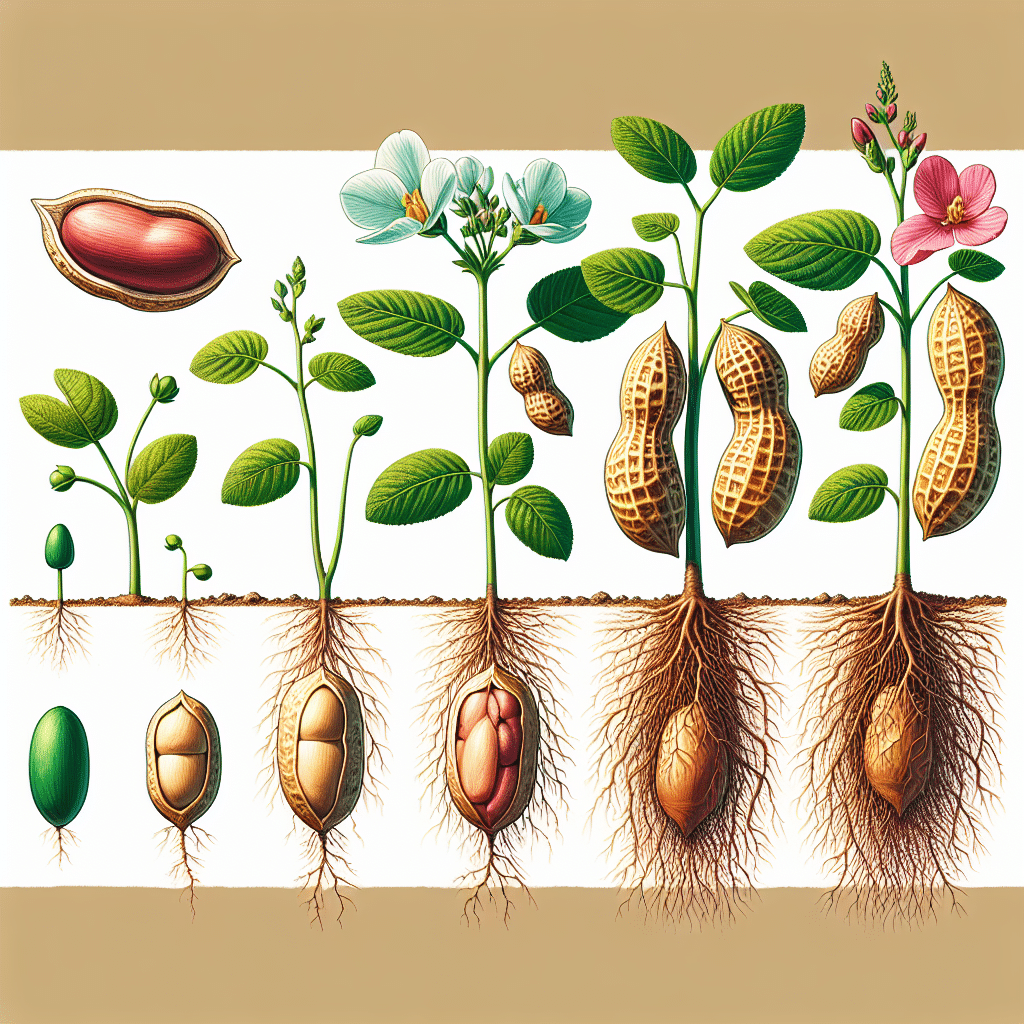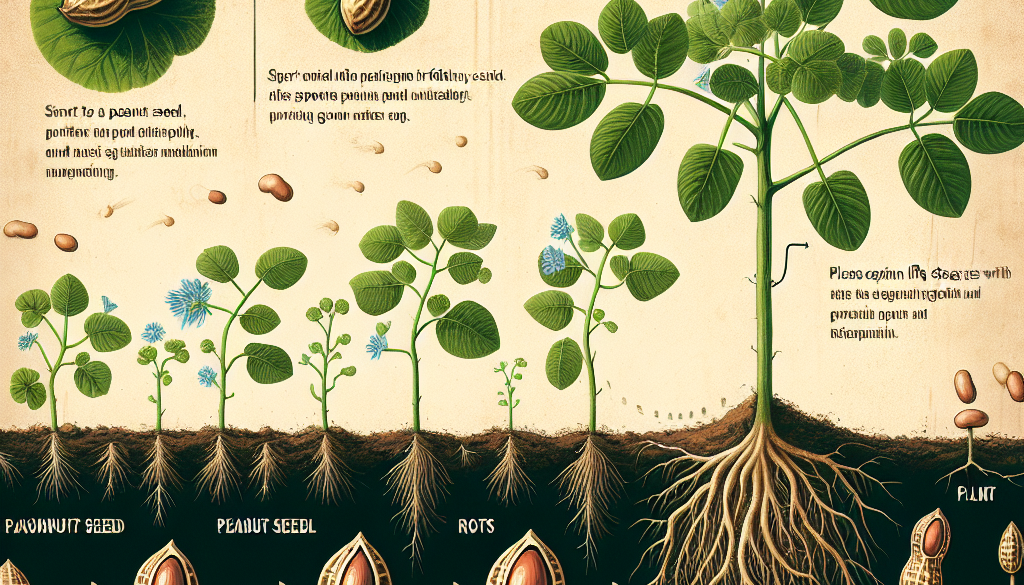Where Does a Peanut Grow: Unearthing The Nutty Fact
-
Table of Contents
- Peanut Growth Explained: The Nutty Facts Unearthed
- The Botanical Background of Peanuts
- Understanding Peanut Cultivation
- Global Peanut Production
- The Lifecycle of a Peanut Plant
- Nutritional Profile and Uses of Peanuts
- Challenges in Peanut Farming
- Innovations in Peanut Agriculture
- Conclusion: The Fascinating World of Peanut Growth
- Discover ETprotein’s High-Quality Peanut Protein Products
Peanut Growth Explained: The Nutty Facts Unearthed

Peanuts, contrary to what their name suggests, are not true nuts but legumes, akin to beans and lentils. This fascinating crop has a unique growth process that sets it apart from other plants. In this article, we will delve into the world of peanuts, exploring where and how they grow, their significance in global agriculture, and some intriguing facts about their cultivation and uses.
The Botanical Background of Peanuts
The peanut, or Arachis hypogaea, is a legume crop grown mainly for its edible seeds. It is native to South America but has spread across the globe due to its popularity and nutritional value. Peanuts are rich in protein, fats, and various essential nutrients, making them a staple in diets worldwide.
Understanding Peanut Cultivation
Peanuts have a unique growth process that distinguishes them from other crops. Here’s how they are cultivated:
- Planting: Peanut seeds are planted in sandy soil, which allows for proper drainage and easy growth of the pegs (or peduncles) that will eventually become peanut pods.
- Flowering: The peanut plant flowers above ground, yet the actual peanut matures below the soil’s surface.
- Pegging: After pollination, the flowers fade, and the ovary begins to elongate and grow down into the ground, a process known as “pegging.”
- Maturation: The pegs, which contain the fertilized ovary, continue to grow downward, eventually forming a peanut pod containing typically 2-4 seeds.
- Harvesting: Once mature, the entire plant, including the roots with the attached peanut pods, is pulled from the soil and allowed to dry before the peanuts are extracted from the pods.
Global Peanut Production
Peanuts are grown in warm climates around the world, with China, India, and the United States being the top producers. They require a long growing season and thrive in regions with light, sandy loam soil. The United States, particularly states like Georgia, Texas, and Alabama, is known for its significant peanut farms.
The Lifecycle of a Peanut Plant
The peanut plant’s lifecycle is fascinating and can be broken down into several stages:
- Germination: Peanut seeds germinate in the warm, moist soil, typically within a week after planting.
- Vegetative Growth: The plant grows leaves and stems, focusing on creating a strong root system.
- Reproductive Stage: The plant produces yellow flowers, which self-pollinate, leading to the formation of pegs.
- Pegging and Pod Development: Pegs grow into the soil, and pods develop over a period of several weeks to a few months, depending on the variety.
- Harvesting: The plant is harvested when the peanuts are fully mature, usually about four to five months after planting.
Nutritional Profile and Uses of Peanuts
Peanuts are not only a tasty snack but also packed with nutritional benefits. They are an excellent source of protein, healthy fats, vitamins E and B complex, minerals like magnesium, and bioactive compounds such as resveratrol. Peanuts are used in various forms, including peanut butter, oil, flour, and as a key ingredient in many dishes and confections.
Challenges in Peanut Farming
Despite their popularity, peanut farmers face several challenges:
- Pests and Diseases: Peanuts are susceptible to various pests and diseases, such as the peanut worm and leaf spot disease, which can significantly impact yield.
- Weather Sensitivity: Peanuts require specific climatic conditions, and extreme weather can damage crops.
- Aflatoxin Contamination: Peanuts can be contaminated with aflatoxins, toxic compounds produced by certain molds, which can pose health risks if not properly managed.
Innovations in Peanut Agriculture
Advancements in agricultural technology have led to improved peanut varieties and farming practices. These include disease-resistant strains, precision agriculture, and better irrigation systems, all contributing to increased efficiency and sustainability in peanut farming.
Conclusion: The Fascinating World of Peanut Growth
In conclusion, peanuts have a unique growth process that begins with planting and ends with harvesting the underground pods. They are a vital crop with significant nutritional value and economic importance. Understanding the lifecycle and cultivation of peanuts can help us appreciate this remarkable plant and the efforts that go into bringing peanuts from the field to our tables.
Discover ETprotein’s High-Quality Peanut Protein Products
If you’re interested in incorporating the nutritional benefits of peanuts into your diet or products, ETprotein offers a range of high-quality peanut protein products. Their peanut protein is ideal for various applications, from sports nutrition to health and wellness products. With ETprotein’s commitment to non-GMO, allergen-free ingredients, you can trust that you’re getting the best plant-based proteins on the market.
About ETprotein:
ETprotein, a reputable protein Chinese factory manufacturer and supplier, is renowned for producing, stocking, exporting, and delivering the highest quality organic bulk vegan protein and plant proteins. They include Organic rice protein, clear rice protein, pea protein, clear pea protein, pumpkin seed protein, sunflower seed protein, mung bean protein, peanut protein etc. Their offerings, characterized by a neutral taste, non-GMO, allergen-free attributes, cater to a diverse range of industries. They serve nutraceutical, pharmaceutical, cosmeceutical, veterinary, as well as food and beverage finished product distributors, traders, and manufacturers across Europe, USA, Canada, Australia, Thailand, Japan, Korea, Brazil, and Chile, among others.
ETprotein specialization includes exporting and delivering tailor-made protein powder and finished nutritional supplements. Their extensive product range covers sectors like Food and Beverage, Sports Nutrition, Weight Management, Dietary Supplements, Health and Wellness Products, and Infant Formula, ensuring comprehensive solutions to meet all your protein needs.
As a trusted company by leading global food and beverage brands and Fortune 500 companies, ETprotein reinforces China’s reputation in the global arena. For more information or to sample their products, please contact them and email sales(at)ETprotein.com today.












